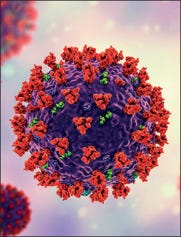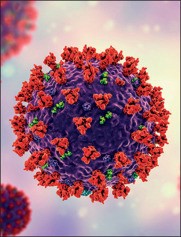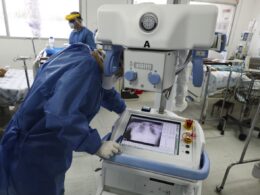The Lancet
Editorial
May 07, 2022
After living for more than 2 years with COVID-19…the world is at a critical point.
After living for more than 2 years with COVID-19-with over 6·2 million confirmed deaths (but probably many more, with an estimated 20 million excess deaths) and over 510 million confirmed cases-the world is at a critical point.
The omicron wave, with its high transmissibility and milder course than previous variants, especially for people who are fully vaccinated and without comorbidities, is abating in many countries.
Restrictions are being relaxed, and people are slowly returning to pre-pandemic activities, including gatherings, office-based working, and cultural events.
Mask mandates are being lifted in many countries. Testing and surveillance have decreased and travelling is recommencing widely.
People are understandably exhausted and want to forget about the pandemic. This would be a grave mistake.
First, the pandemic situation is not the same everywhere in the world.
China, for example, continues to employ its so-called dynamic zero COVID strategy of mass testing, quarantining of those testing positive, and lockdown of districts or even whole cities (most recently Shanghai).
Chinese authorities have been harshly and ruthlessly implementing these measures, without much consideration for human costs.
The goal is, according to Chinese officials, to avoid further spread, to protect the health system, and to avert deaths.
The problem is that older and vulnerable people are often not fully vaccinated, and the efficacy of the licensed vaccines is suboptimal.
For China, the top priority must be to accelerate an effective vaccination strategy. The current approach is not a long-term solution for Chinese people.
Second, the global vaccination strategy is far from on track. Unacceptable vaccine inequity persists.
WHO’s goal of complete vaccination in at least 70% of people in every country by June, 2022, is way out of reach.
Although 59·7% of people globally have received two vaccine doses, in more than 40 countries fewer than 20% are completely vaccinated.
Even in high-income countries, a sizeable proportion of the population continue to refuse vaccination.
The emergence of a new SARS-CoV-2 variant is almost inevitable with continuous high transmission rates.
The BA.4 and BA.5 omicron subvariants first seen in South Africa are being monitored closely.
Continuing vigilance is needed everywhere.
Third, vaccine inequity is mirrored by slow and delayed access to one of the few effective oral treatments for COVID-19-paxlovid.
When taken early, paxlovid reduces the risk of hospitalisation and death by 89%.
Although high-income countries are ordering millions of doses from the manufacturer, Pfizer, mechanisms to make paxlovid available in low-income and middle-income countries via the Medicines Patent Pool are slow.
An agreement has been reached with 35 generic manufacturers in 12 countries, but is not expected to deliver the drug before 2023.
Finally, now is the time to plan, learn from mistakes, and create strong resilient health systems, as well as national and international preparedness strategies with lasting funding.
Capacities of health systems need to be strengthened, not only to be ready for future pandemics, but immediately to deal with the delays in treatment, diagnosis, and care for other diseases after the disruption of the past 2 years.
Catch-up vaccine campaigns for diseases such as measles are urgently needed.
Preparedness plans, both nationally and internationally, must have a strong emphasis on early data sharing and transparent surveillance.
One Health should be the underlying principle, with simultaneous consideration of both human and animal health.
At the 75th World Health Assembly (May 22–29, 2022), there is an opportunity to examine progress in revising the International Health Regulations and to discuss further a pandemic treaty-the process for a treaty has been far too slow.
The Intergovernmental Negotiating Body’s progress report is not expected until 2023.

Nationally, countries need independent inquiries into their responses to COVID-19.
Learning from mistakes is never easy and governments can be reluctant to even accept that they have been made.
When the UK High Court ruled last week that it was unlawful to discharge hospital patients to care homes without COVID-19 testing, the UK Government claimed to have acted on the best evidence available at the time.
This is a blatant lie.
The evidence for asymptomatic transmission was clearly available by late January, 2020.
Now is not the time to turn away from COVID-19 or rewrite history.
It is time to
- vigorously engage,
- redouble efforts to end the acute phase of the pandemic in 2022 for all,
- and lay strong sustainable foundations for a better future with clear accountabilities and honest acceptance of uncomfortable truths.
Now is not the time to turn away from COVID-19 or rewrite history.
Originally published at https://www.thelancet.com.












